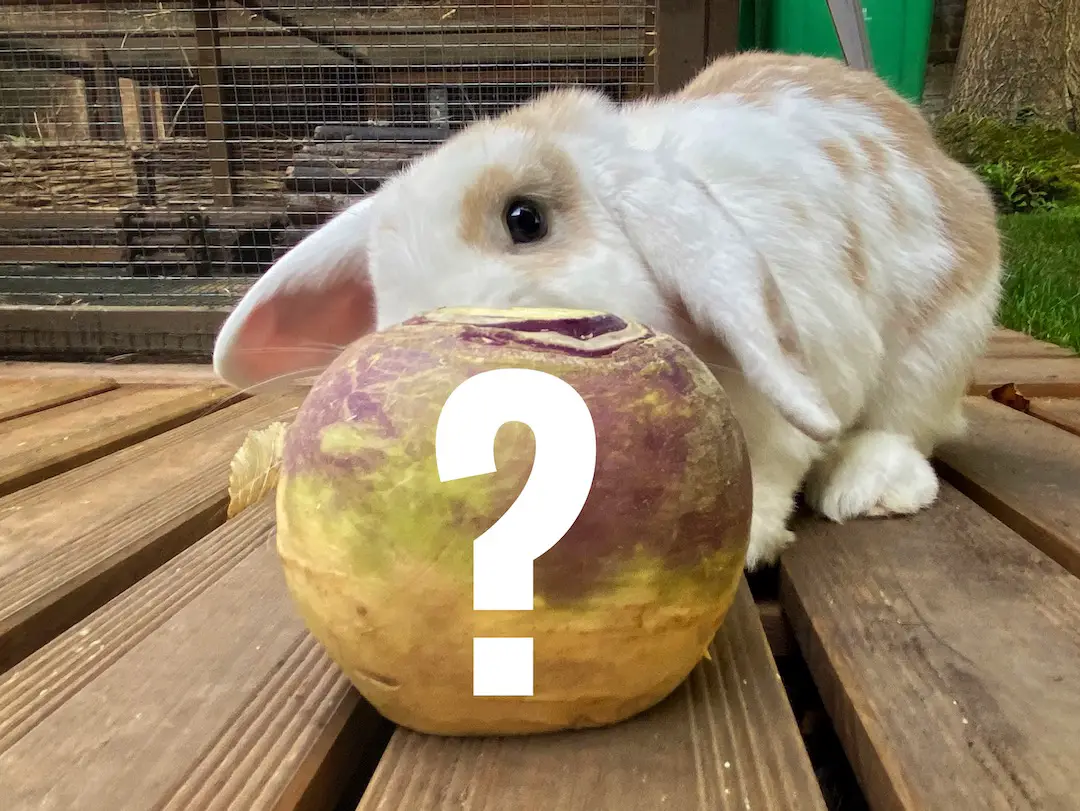I quite like shopping in supermarkets (my partner is the opposite). I find it relaxing (assuming I’m not in a hurry) wandering up and down the aisles.
In our local supermarket, the first one you come to is the vegetable aisle. And as I stroll along, eyeing up the variety of goods, I often ask myself – ‘would that be a good treat for my bunnies?’.
One of the vegetables on display is swede (also called rutabaga if you’re in the States), a large root vegetable that’s a bit like a large, sweet turnip.
So, if you too wander the aisles with your fluffy friends in mind, here is the answer to whether rabbits can eat swede safely as a treat.
Can rabbits eat swede?
Rabbits can eat swede, or rutabaga, safely. It is not toxic (poisonous) to rabbits. However, swede should only be fed in small portions occasionally to bunnies, as part of a varied diet mainly based on hay. The peel, stem and leaves of swede are also safe for rabbits to eat. Swede is high in carbohydrates, so should only be an occasional treat for rabbits. The main diet for a rabbit should be hay, with a handful of greens each day, and water. A daily portion of swede for a rabbit is about a tablespoon for a 6lb adult rabbit.
How much swede should I give my rabbit?
You should only give swede as a treat to your rabbit – it should not be their main food (see below for some of the reasons why).
Hay should always be the main part of your bunny’s diet.
You can give up to about a tablespoon of swede to your bunny daily.
If you have younger rabbits, it’s best to introduce foods one at a time to ensure that their developing digestive systems can adjust to the new food.
It’s best to wait until rabbits are at least twelve weeks old before introducing any foods like swedes.
It’s also a good idea to rotate which vegetables and greens you feed your rabbit. The variety is good for their diet and health, ensuring your rabbits get all the minerals and vitamins they need.
It also makes sure that they don’t get too much if a particular vegetable is high in one mineral or vitamin.
Is swede good for rabbits?
| Ingredient | Amount per 100g of swede / rutabaga |
| Calories | 155kJ; 37 kcal |
| Fat | 0.16g |
| Carbohydrate | 8.62g |
| Fibre | 2.3g |
| Sugars | 4.46g |
| Protein | 1.08g |
| Thiamine (B1) | 0.09mg |
| Riboflavin (B2) | 0.04mg |
| Niacin (B3) | 0.7mg |
| Vitamin B6 | 0.1mg |
| Folate (B9) | 21µg |
| Vitamin C | 25mg |
| Calcium | 43mg |
| Iron | 0.44mg |
| Magnesium | 20mg |
| Manganese | 0.131mg |
| Phosphorus | 53mg |
| Potassium | 305mg |
| Zinc | 0.24mg |
| Water | 89.4g |
Swedes do contain some helpful nutrients to rabbits. But the main contribution is carbohydrates (with a high sugar content).
You might think that the high levels of vitamin C would be good. But bunnies are able to manufacture vitamin C themselves.
Swedes aren’t poisonous (toxic) to rabbits – it’s just that they’re not very healthy for them.
What are the risks in feeding swede (rutabaga) to rabbits?
Feeding swedes to rabbits is risky if you give them too much.
Swedes should only be a small-sized treat, not a major part of their diet.
If you give bunnies too much swede or rutabaga, you risk two dangers:
In the short term, your rabbit may have trouble digesting the swede (their digestive systems are delicate). This can lead to bloating, and GI stasis (a bit like constipation).
This can be extremely dangerous to rabbits – if you think your rabbit has GI stasis, contact a vet straightaway.
In the longer term, swedes are high in calories, and with the wrong mix of nutrients for rabbits. If rabbits eat mainly swedes, they may become fat and unhealthy, and not live as long.
Also, rabbits need plenty of fibre found in hay to keep wearing down their teeth (rabbits’ teeth never stop growing).
If bunnies are fed mainly on food like swedes, their teeth get too long. This can lead to all sorts of problems, including with their ears and their balance.
So you should think of swedes as being a little like sweets for toddlers – a small amount every now and then is fine as a treat, but it shouldn’t be the main part of their diet.
What if my rabbit doesn’t like swede?
If your rabbit doesn’t like swede – no problem. Just don’t give them any!
Just like humans, rabbits have likes and dislikes. Not all people like swedes, and neither do all bunnies.
Where swede comes from, and a few other fun facts about swedes
Swedes come from a cross between turnips and cabbages. The earliest reference we have (from the early seventeenth century) comes from a botanist finding the vegetables growing wild in Sweden.
The king of Sweden (Gustav III) sent some seeds to a Scottish banker called Patrick Miller around 1791-2 – and that’s why these vegetables earned the name ‘swedes’ in Britain.
Why was the king giving presents to a Scottish banker?
Because Miller created plans for a super-warship. Other countries didn’t show any interest, but Sweden did. Miller sent them the prototype – the Experiment of Leith.
The ship arrived too late to be used in war, but Sweden was still grateful, and so the king sent his gift.
The swede seeds came in an illustrated snuff-box, now owned by the Victoria and Albert museum in London. You can see more about it here.
The name rutabaga comes from the Swedish word ‘rottebagge’, which literally means ‘thick root’.
Have you tried swede and found it too bitter?
You may be a ‘supertaster’ – genetically more sensitive than the rest of us.
Some people have a specific gene (a variant of TAS2R38), which makes them more sensitive to certain foods. (This also applies to horseradish, broccoli and some other foods).
People with the gene find swedes twice as bitter as the rest of us – so may find it difficult to eat. [Source]
You’re not fussy – you’re sensitive.
Conclusion
You can safely give swede to your pet bunny, but only as an occasional treat. This hybrid cabbage/turnip is too high in starchy carbohydrates to be a significant part of a rabbit’s diet.
Other posts
If you’re thinking about what you can feed safely to bunnies, check out these other posts:
- Can rabbits eat mangetout?
- Can rabbits eat rocket (arugula if you’re American)?
- What herbs are safe for rabbits to eat?
- Why is Timothy hay so good for rabbits?
- What fruit can rabbit eat?
- Is it true that apple cores are dangerous to rabbits?
- Can rabbits eat radishes?
And if you want to keep your bunny entertained, check out the cheap rabbit toys we like (and so did our fluffy friends).


